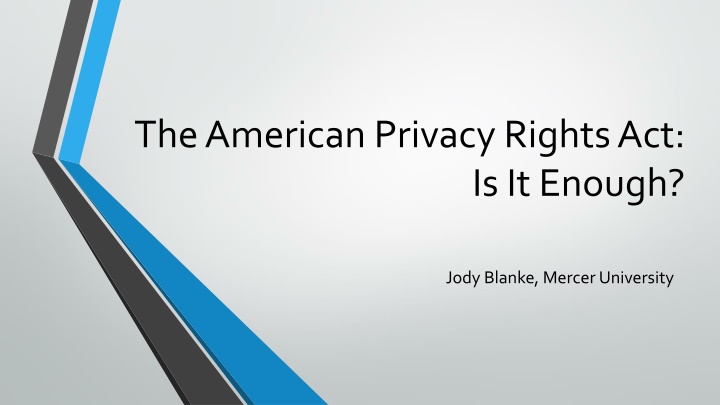
American Privacy Rights Act Analysis: Is It Comprehensive Enough?
Delve into the details of the proposed American Privacy Rights Act (APPA), assessing its provisions, implications, and potential impact on privacy rights. Explore how the bill addresses data security, individual control, civil rights protection, and more, while considering its preemption of state privacy laws and the shifting political landscape.
Download Presentation

Please find below an Image/Link to download the presentation.
The content on the website is provided AS IS for your information and personal use only. It may not be sold, licensed, or shared on other websites without obtaining consent from the author. If you encounter any issues during the download, it is possible that the publisher has removed the file from their server.
You are allowed to download the files provided on this website for personal or commercial use, subject to the condition that they are used lawfully. All files are the property of their respective owners.
The content on the website is provided AS IS for your information and personal use only. It may not be sold, licensed, or shared on other websites without obtaining consent from the author.
E N D
Presentation Transcript
The American Privacy Rights Act: Is It Enough? Jody Blanke, Mercer University
The Proposed Bill The proposed American Privacy Rights Act (APPA) is still in committee in both the Senate (the Senate Committee on Commerce, Science and Transportation) and the House (the House Committee on Energy and Commerce) What had been largely a bi-partisan effort is starting to see some fissures along party lines
General Provisions of the Bill Applies to businesses and nonprofits (excludes some small businesses) Defines sensitive data Requires data minimization Provides for transparency Provides for individual control over data and opt-out rights Requires reasonable data security measures and executive responsibility Requires additional obligations for large data holders and data brokers Provides civil rights protection on the basis of race, color, religion, national origin, sex, or disability Requires annual algorithm impact assessments Enforcement by FTC and state attorneys general Provides for private rights of action
Preemption The proposed bill would preempt most of the provisions of state privacy laws Nineteen states have now passed comprehensive privacy laws: California, Colorado, Connecticut, Delaware, Indiana, Iowa, Kentucky, Maryland, Minnesota, Montana, Nebraska, New Hampshire, New Jersey, Oregon, Rhode Island, Tennessee, Texas, Utah, Virginia
California Consumer Privacy Act is capable of being associated with, or could reasonably be linked, directly or indirectly, with a particular consumer or household. Personal information includes, but is not limited to, the following: (A) Identifiers such as a real name, alias, postal address, unique personal identifier, online identifier Internet Protocol address, email address, account name, social security number, driver s license number, passport number, or other similar identifiers. (o) (1) Personal information means information that identifies, relates to, describes, (E) Biometric information. (F) Internet or other electronic network activity information, including, but not limited to, browsing history, search history, and information regarding a consumer s interaction with an Internet Web site, application, or advertisement. (G)Geolocation data. (K)Inferences drawn from any of the information identified in this subdivision to create a profile about a consumer reflecting the consumer s preferences, characteristics, psychological trends, preferences, predispositions, behavior, attitudes, intelligence, abilities, and aptitudes.
California Attorney General Opinion On March 10, 2022, the Attorney General of California issued an Opinion pursuant to his authority to give opinions on questions of law to specified public officials upon their request. California Assemblyman Kevin Kiley asked whether, under the CCPA, a consumer s right to receive the specific pieces of information that a business has collected about that consumer applies to internally generated inferences. The Opinion stated that the plain language of the statute, as well as the legislative history, persuade us that the CCPA purposefully gives consumers a right to receive inferences, regardless of whether the inferences were generated internally by the responding business or obtained by the responding business from another source.
California Attorney General Opinion The Opinion made clear that if a business holds a consumer s personal information, regardless of whether it gathered the information from the consumer, found the information in public repositories, bought the information from a broker, inferred the information through some proprietary process of the business s own invention, or any combination thereof, it must disclose that information to consumer. The Opinion stated that inferences appear to be at the heart of the problems that the CCPA seeks to address. [C]onsumersmay never know that they are being excluded from seeing certain ads, offers, or listings based on discriminatory automated decisions. In almost every case, the source as well as the substance of these inferences is invisible to consumers.
California Privacy Protection Agency The CPPA is an independent agency charged with enforcing the provisions of the CCPA. A letter dated June 26, 2024 to the House Energy & Commerce Committee expressed the CPPA s opposition to the APRA: The Privacy Agency would support a federal privacy law that sets a floor on protections and allows states to continue to adopt stronger safeguards, consistent with most federal privacy laws. Instead, APRA seeks to preempt nearly every provision in groundbreaking state laws like the California Consumer Privacy Act (CCPA).
California Privacy Protection Agency Similarly, APRA seeks to eliminate privacy protections Californians enjoy with respect to sexual orientation, union membership, and immigration status. While these categories are considered sensitive personal information in California, they are not afforded these protections in the APRA. This is a key distinction, in part because APRA exempts inferences made from publicly available information as long as they do not reveal information about an individual that would constitute sensitive covered data and are not combined with covered data. For example, if a business infers that an individual is a member of the LGBT community based on factors such as social media posts and address, the business would not be obligated to disclose, correct, or delete this inference because it would not be covered data. In contrast, the California Attorney General has clarified that inferences derived from publicly available information are covered by the CCPA.
CPPA Proposed Regulations The CPPA s July 2024 proposed regulations contain a definition: Artificial intelligence means a machine-based system that infers, from the input it receives, how to generate outputs that can influence physical or virtual environments. The artificial intelligence may do this to achieve explicit or implicit objectives. Outputs can include predictions, content, recommendations, or decisions. The phrase artificial intelligence appears 22 times in this document and the word infer (or its variants)12 times.
Senate Hearing on Privacy and AI On July 11, 2024, the Senate Committee on Commerce, Science and Transportation held a hearing on The Need to Protect Americans Privacy and the AI Accelerant Senator Maria Cantwell, Chair, in her opening statement: Without a strong privacy law, when the public data runs out, nothing is stopping them from using our private data. I'm very concerned that the ability to collect vast amounts of personal data about individuals, and create inferences about them quickly at very low cost, can be used in harmful ways, like charging consumers different prices for the same product. Privacy is not a partisan issue. According to Pew Research, the majority of Americans across the political spectrum support regulation. I believe our most important private data should not be bought or sold without our approval. And tech companies should make sure they implement these laws and help stop this kind of interference.
Senate Hearing on Privacy and AI Professor Ryan Calo, University of Washington, wrote: Privacy rules are long overdue. But the acceleration of AI over the past few years threatens to turn a bad situation into a dire one. AI exacerbates consumer privacy concerns in at least three ways. First, AI fuels an insatiable demand for consumer data. Second, AI allows companies and governments to derive intimate details about people from widely available information. And third, AI renders consumers more vulnerable to commercial exploitation by deepening the asymmetries of information and power between consumers and companies that consumer protection law exists to address. As I told Wired Magazine in a 2021 story about the dangers of facial recognition technology, AI is like Soylent Green: it s made out of people.
Senate Hearing on Privacy and AI Amba Kak, Co-Executive Director, AI Now Institute, wrote: First, privacy risks are implicated across the AI life cycle. The generative AI boom further unleashes new forms of familiar privacy harms, supercharges the incentives for irresponsible data surveillance, and creates conditions ripe for extractive and exploitative business models. Second, the turn toward large-scale AI further consolidates Big Tech s already staggering control over consumer data, which deepens power asymmetries and allows these companies to act recklessly and with impunity. A strong data minimization rule would ensure not only the advancement of privacy, but would also act as a powerful curb on the concentration of power we ve seen in this sector. Finally, a legally binding data privacy mandate, including strong data minimization, individual data rights, algorithmic impact assessments, and protections against algorithmic discrimination, offers a foundational toolkit for demanding accountability from AI companies.
Senate Hearing on Privacy and AI UdbhavTiwari, Direct of Global Product Policy, Mozilla, wrote: At Mozilla, we believe that comprehensive privacy legislation is foundational to any sound AI framework. Without such legislation, we risk a race to the bottom where companies compete by exploiting personal data rather than safeguarding it. Profiling and Manipulation: AI can infer sensitive attributes about individuals, leading to potential privacy violations if used for targeted content or discrimination. This is especially true for advertising, a field where AI and machine learning have already been leveraged for years to predict the wants and desires of unsuspecting consumers.


